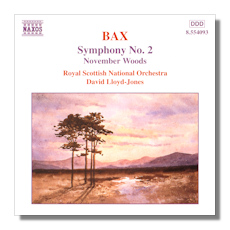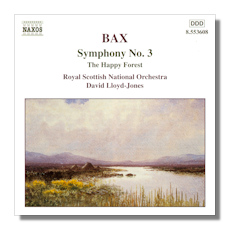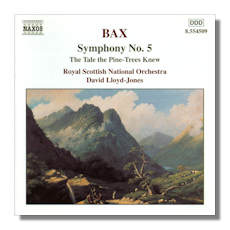
The Internet's Premier Classical Music Source
Related Links
- Bax Reviews
- Latest Reviews
- More Reviews
-
By Composer
-
Collections
DVD & Blu-ray
Books
Concert Reviews
Articles/Interviews
Software
Audio
Search Amazon
Recommended Links
Site News
 CD Review
CD Review
Arnold Bax

Symphonies
- Symphony #2
- November Woods
Royal Scottish National Orchestra/David Lloyd-Jones
Naxos 8.554093 56:51


- Symphony #3
- The Happy Forest
Royal Scottish National Orchestra/David Lloyd-Jones
Naxos 8.553608 53:33


- Symphony #5
- The Tale the Pine-Trees Knew
Royal Scottish National Orchestra/David Lloyd-Jones
Naxos 8.554509 57:51
To those unfamiliar with the music of Bax and wondering what a sampling of his compositions might sound like, they might try to imagine a style divulging elements from the drier sides of Rachmaninoff and Korngold. The voice of Vaughan Williams can occasionally be heard in Bax's music, as well, and one might also notice other presences. But, these influences noted, Bax was largely his own man, a conservative content to go his own way, both in the arts and in his personal life. Despite his thematic and orchestrational abilities, he never reached the fame and acceptance attained by countrymen Vaughan Williams and Elgar. I think his lower status was largely due his lesser popularity at home during his lifetime, which owed much to his virtual rejection of England and its culture, which was brought on by the composer's adoption of Ireland as his second country, where he lived and studied the history and language of the people. As a poet and writer he even used the pseudonym of Dermot O'Byrne, turning out successful novels.
But one cannot fully charge his second-tier status to his love of Ireland and his turning away from England (and to his literary diversions). He was perhaps a notch below Vaughan Williams and Elgar, but still deserves greater attention than he has generally garnered over the years.
This series of his symphonies began with a reading of his First, coupled with two fillers – In the Faery Hills and The Garden of Fand. Conductor Lloyd-Jones and his Royal Scottish National Orchestra players splendidly perform all three works, and Naxos lavished the effort with its usual fine sound. Among the succeeding issues we find a Third (1929), probably his most often performed symphony, that is also superbly played here, at least the equal of the Bryden Thomson/Chandos effort. For those wanting to try Bax before diving headlong into his music, this Naxos offering of the Third and generally light-hearted The Happy Forest, might be the place to start.
But it may be the Second (also 1929) and Fifth Symphonies (1932) that will attract attention from the more adventurous and seasoned listeners. The former work is grittier than the comparatively sumptuous and lyrical Third, and offers greater complexity – a sort of rewarding complexity, however. The thematic relationship between the first and third movements is subtly fashioned with several recurring motifs. All in all, this may be the most compelling of Bax's symphonies, and once again Lloyd-Joes and the Royal Scottish players deliver an excellent performance. The conductor tends to favor a more muscular and lean approach in all the symphonies, and his vision is always borne out by the fine results.
But the Fifth cannot be overlooked here, either. The composer described this and The Tale the Pine-Trees Knew as "craggy northern works." Indeed, they are. The spirit, if not the instrumentation and thematic character, of Sibelius are in evidence. Yet, I'm not sure that this symphony is quite on the level with the earlier ones, particularly the first three. Still, it is well worthwhile to hear, especially in a recording this fine. And the aforementioned filler is an atmospheric and finely-crafted work. In fact, all the fillers coming with these symphonies are colorful and often fascinating works. In the three recordings here, Naxos supplies fine sound and intelligent notes. At their budget price, any and all of these discs would be well worth purchase.
Copyright © 2000, Raymond Tuttle





















